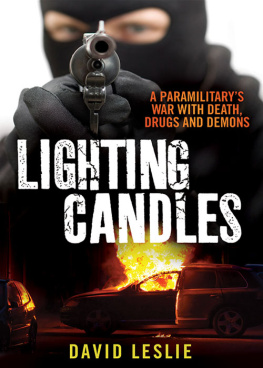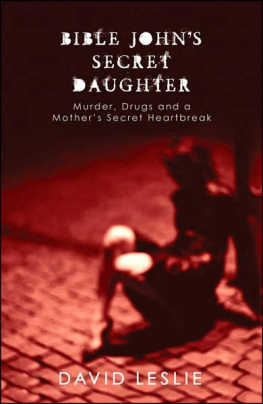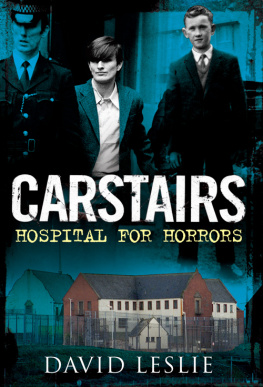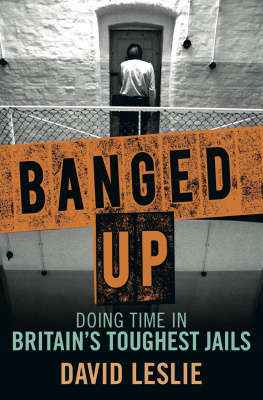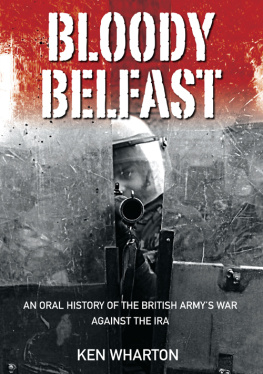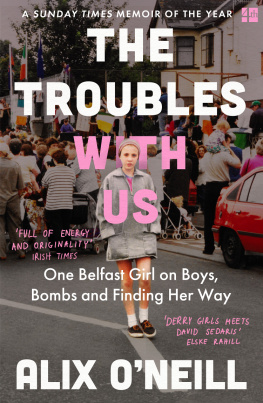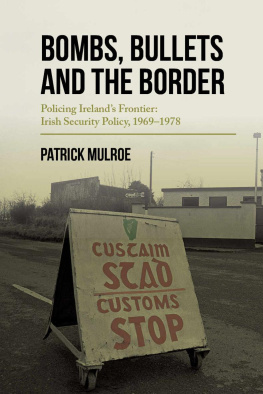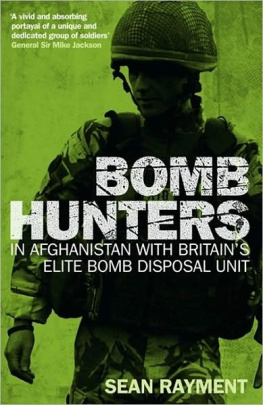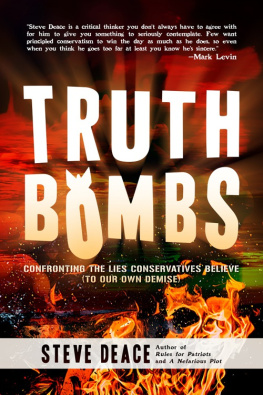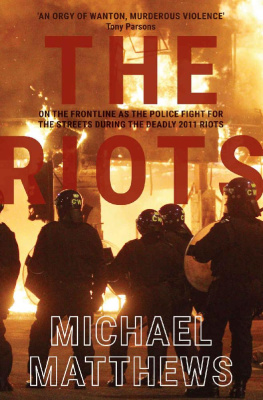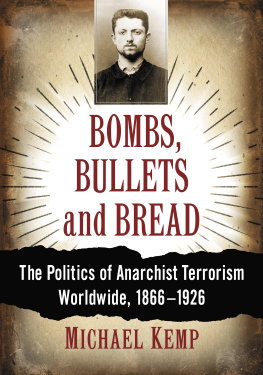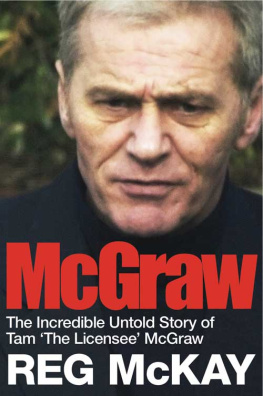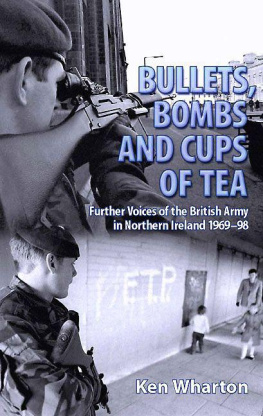It has only been possible to tell this remarkable story because of the unstinting and generous help given by Manny McDonnell. Over many, many hours of interviews and meetings, our friendship, which began two decades ago, has grown.
It is at his request that this book is dedicated to two people: his mother, Nellie, whose passion for and loyalty to Ireland never diminished, and to his good friend Billy Kane, murdered in his Belfast home on 15 January 1988, aged just 20.
CONTENTS
THE IRISHMAN WAS CERTAIN he was being watched. He knew it didnt take a genius to work that out. Years on the terrifying streets of Belfast had given him an extra sense that sent out warning signals when something was not right, when the routine of the day was out of place. At least he was sure that this time the game of cat and mouse would not end with a bullet in the head. But he was a man who had learned never to take chances, to always assume the worst.
Yet even at this moment of peril he found it hard to stifle a laugh at the antics of the watchers. It might be late summer, but the streets of Benidorm on Spains sweltering Costa Blanca were still thronged by sweating tourists wearing little more than was needed to allow the Mediterranean sun access to most of their bodies while retaining their modesty.
Mostly their flimsy outfits were soft and gaily coloured. But a handful of visitors looked out of place, attracting not just the interest of the Irishman but also that of scores of bemused sun worshippers sipping cool drinks in crowded street-side bars or peering into souvenir shops. The giggles of red-skinned overweight women caused their huge breasts and bellies to jiggle and wobble as they gulped beer and shushed cries of banana men from children as the watchers passed.
The pale skins of those who were the subject of his attention marked out the men as new arrivals. No chance though, thought the Irishman, of them suffering painful sunburn. Their heavy waterproof yellow luminous jackets would have been at home on a building site or damp chilly Belfast or Glasgow housing scheme. In Benidorm they were more suited to a fancy-dress parade.
Even without any giveaway lettering on their coats, Emmanuel Manny McDonnell knew a policeman when he saw one. Hed been sniffing out cops, undercover Army operatives, rival para-militaries and touts in his native Ulster since his schooldays.
In Ireland there wasnt merely a daily need to watch for anything out of the ordinary. Eyes and ears had to be on the alert every second of the day and night. Men and women listened and watched and heeded warnings, knowing a slip could cost a life.
Manny had been recruited to beef up security on an operation in Spain that was coming apart at the seams through careless talk and needless bravado. Not so long ago, Volunteers in arms like him had been smuggling guns, bombs, explosives and, on occasion, fugitives past police roadblocks and Army checkpoints in the cause of freedom. Here, the merchandise was a sickly brown substance called hashish and the rewards for sneaking it across Europe came in currency, millions and millions of pounds that gave the holders a freedom not just to live the life of which they had dreamed but to spend that life anywhere in the world.
The ingenuity of the smugglers had to be marvelled at; the lofty reputations of some of the businessmen who had invested in the racket and earned mind-boggling returns would cause astonishment had details of their crafty venture reached the ears of fellow members at their Rotary Club lunches or Round Table dinners.
For years, the gang that had hired Manny and his colleagues from Belfast had pocketed fortunes with a carelessness born of a ludicrous belief that the torrent of money would continue to pour into their hands for all time.
The Irishman knew otherwise. From the outset he had realised there were too many in on what was no longer a secret. Too many with loose tongues and outstretched hands pleading, Oliver-like, to those running the show, for more and more. Too many wanting not just a share but an ever bigger share. Too many spending too much money. Too much greed. Such recklessness, he was convinced, would ultimately lead into the pit of disaster; the participants would be forced to swap their luxury villas for grim prison cells. And if they fell, then he too might tumble.
During the Troubles at home he had learned how to sniff out an informant. He was convinced not just that a grass had hinted of this multimillion-pound smuggling racket to the authorities but also that he knew his identity.
And thus he was sure the day of reckoning would eventually arrive. Hed known for some time that detectives in Scotland had called on the help of their colleagues in the Spanish Cuerpo Nacional de Polica, the CNP. He wondered too whether Interpol had been contacted.
Weeks earlier he had spotted a police presence in Benidorm but could not have known then that as far as evidence was concerned the authorities had little that might stand up in a court. Coincidence and suspicion were not proof.
But now the sight of men wearing serious expressions and their ludicrous luminous jackets mingling with package holidaymakers told him that day had come too soon. Had their appearance occurred ten years later, the police would probably have been mistaken for characters in the popular television comedy series to which Benidorm gave its name. But this was no fantasy; there was nothing comical about the likely outcome. Not for him. Not for his friends. Not for those he had been hired to help.
Manny watched the watchers as they watched him. He listened to snatches of their conversations, quickly recognising that the harsh accents were those of Glasgow, aware this was that moment of fear and thrill he had known so often during furtive operations with his unit in Belfast. That tick of time when the unexpected pays a surprise call. That moment for which all his experience and guile had prepared him, for the flash when suddenly danger appears. Now he knew the time of ultimate decision had come.
In Ulster, there was customarily no going back. Too often it was shoot or be shot, kill or be killed. Every operation, every move had to be thought out and planned to the minutest detail. An escape route always needed to be prepared because even the most carefully scripted plan could not take into account the unforeseen. Things could, and did, go wrong.
He had graduated through the violent ranks of paramilitaries dedicated to releasing Northern Ireland from the chains that bound the province to the London government of Britain. Like many, he had served and fought with the Irish Republican Army, had broken away with the group that became the feared Irish National Liberation Army and then joined with the relative few who established the ultimate in terror, the Irish Peoples Liberation Organisation. Even the IRA believed the IPLO was too violent for the good of Ireland. Along the way he had seen many friends and family members lowered into their graves. Here, among the bustle but relative safety of Benidorm the consequences would not be so fatal, but catastrophic nonetheless.
Even as he zigzagged across the busy Spanish streets, strolled with apparent unconcern through bars, stopped to window shop, constantly checking to confirm he was still being followed, he knew that even at this eleventh hour there might be a way out, a means of fooling the police into believing they might be lurking along the wrong track. That there was an escape that could even allow the smugglers to resume after a reasonable break.
First, though, he needed to convince the men behind the smuggling racket that danger was close by. Cops are here, he warned one of the gang and was astonished by the mans apparent indifference to the threat that was so near at hand. He made a telephone call to Scotland, pleading: Do nothing next time. The police are on to you.
Next page
